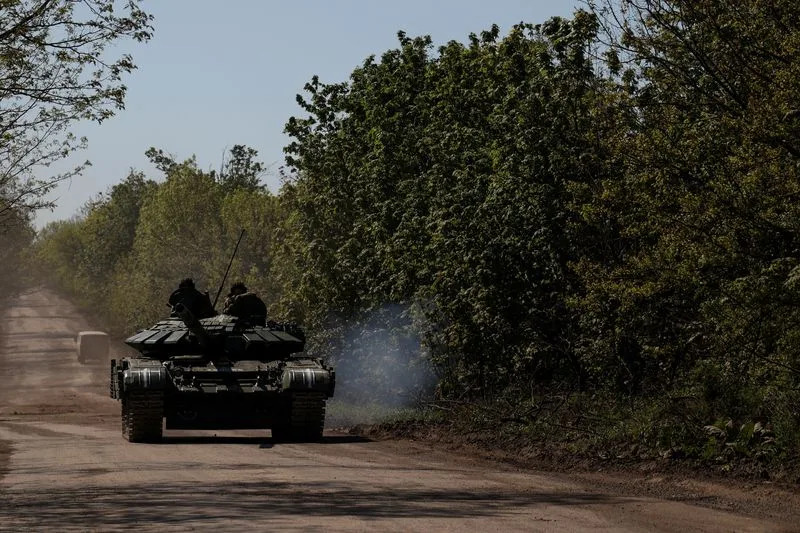Reuters
Russia acknowledges retreat north of Bakhmut; mercenary boss calls it a ‘rout’
Olena Harmash and Ivan Lyubysh-Kirdey – May 12, 2023

KYIV/KOSTIANTYNIVKA, Ukraine (Reuters) -Moscow acknowledged on Friday that its forces had fallen back north of Ukraine’s battlefield city of Bakhmut after a new Ukrainian offensive, in a retreat that the head of Russia’s Wagner private army called a rout.
The setback for Russia, which follows similar reports of Ukrainian advances south of the city, suggests a coordinated push by Kyiv to encircle Russian forces in Bakhmut, Moscow’s main objective for months during the war’s bloodiest fighting.
It means both sides are now reporting the biggest Ukrainian gains in six months, although Ukraine has given few details and played down suggestions a huge, long-planned counteroffensive had officially begun.
Russian Defence Ministry spokesman Igor Konashenkov said Ukraine had launched an assault north of Bakhmut with more than 1,000 troops and up to 40 tanks, a scale that if confirmed would amount to the biggest Ukrainian offensive since November.
The Russians had repelled 26 attacks but troops in one area had fallen back to regroup in more favourable positions near the Berkhivka reservoir northwest of Bakhmut, Konashenkov said.
Yevgeny Prigozhin, head of the Wagner forces that have led the campaign in the city, said in an audio message: “What Konashenkov described, unfortunately, is called ‘a rout’ and not a regrouping”.
In a separate video message, Prigozhin said the Ukrainians had seized high ground overlooking Bakhmut and opened the main highway leading into the city from the West.
“The loss of the Berkhivka reservoir – the loss of this territory they gave up – that’s 5 sq km, just today,” Prigozhin said.
“The enemy has completely freed up the Chasiv Yar-Bakhmut road which we had blocked. The enemy is now able to use this road, and secondly they have taken tactical high round under which Bakhmut is located,” said Prigozhin, who has repeatedly denounced Russia’s regular military over the past week for failing to supply his men in Bakhmut.
Reuters was not able to independently verify the situation in the area.
Ukraine typically withholds comment on its operations while they are under way, and the military command has said only that its troops have pushed forward about 2 km near Bakhmut.
A Ukrainian unit said two days ago it had defeated a Russian brigade southwest of the city recapturing a swathe of land, and Prigozhin also said the Russian brigade there had fled.
Prigozhin, whose troops have been fighting to push Ukrainian forces out of Bakhmut’s Western outskirts, has said the north and south flanks, guarded by regular Russian troops, were crumbling. Russia’s defence ministry denies this.
TURNING POINT
In Kostiantynivka, about 20 km (12 miles) southwest of Bakhmut, firefighters were battling a blaze at a house that went up in flames after it was struck by Russian shells.
“It hit the roof and the roof collapsed. My neighbour rushed outside and started shouting, asking for help,” said Oleksandr Lazorka, who lives next door. “We pulled out a blind woman – an elderly, blind woman – from under the rubble and then the fire erupted.”
The 15-month-old war in Ukraine is at a turning point, after six months during which Kyiv kept its troops on the defensive while Russia mounted a winter campaign that brought the bloodiest ground combat in Europe since World War Two but yielded scant gains.
Since the start of this year, Kyiv has received hundreds of new Western tanks and armoured vehicles, holding them back in preparation for a long-awaited counteroffensive to recapture occupied territory.
Ukrainian officials have played down the suggestion that their offensive is already under way: President Volodymyr Zelenskiy said in an interview this week Kyiv needed more time for equipment to arrive. Prigozhin called that deceptive and said the Bakhmut advances amounted to the start of Kyiv’s campaign.
Moscow has been preparing since last autumn for an expected onslaught, and has built lines of anti-tank fortifications along hundreds of miles of front.
It has begun evacuating civilians who have been living near the conflict zone in Ukraine’s partially occupied Zaporizhzhia province.
“We used to go out and watch (the shelling). Especially at night, you could see the flashes as they launch,” said Lyudmila, a 22-year-old from Kamianka-Dniprovska now in makeshift accommodation in the Russian-controlled Ukrainian port of Berdyansk.
“We’ve had shells land nearby and when it landed the entire sky was red,” she said.
In comments published on Friday, the commander of Russia’s Black Sea Fleet said its defences were also being tightened amid a flurry of Ukrainian drone strikes targeting its home base, the Crimean port of Sevastopol.
Zelenskiy, who has been rallying his country for the planned offensive, said in a social media post that “our path ahead is not easy”, but Ukraine was “much stronger now than last year or in any other year of this war for freedom and independence of our country”.
He spoke on Friday with British Prime Minister Rishi Sunak, thanking him for a promise of long-range cruise missiles. Britain announced the missiles on Thursday, breaking one of the last big Western taboos over weaponry previously deemed to carry too great a risk of provoking Russia.
(Reporting by Reuters bureaux, Writing by Peter Graff and Kevin Liffey)
